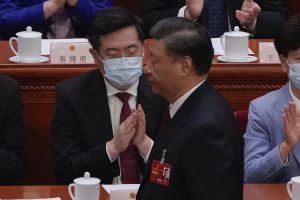China-watchers have been abuzz recently at the dismissal of Qin Gang, China’s foreign minister, and the status of the so-called wolf-warrior diplomats. In the background to recent events, and especially those involving the diplomats, are the changes that have taken place at the Chinese Ministry of Foreign Affairs over the past few years.
In the People’s Republic of China, diplomats who have a large number of foreign contacts are under a constant cloud of suspicion that they might be engaging in espionage. This tendency has only become more pronounced under Xi Jinping, with his emphasis on “national security” and marked fear of color revolutions.
In 2019, Party Secretary of the Ministry of Foreign Affairs Zhang Yesui, a former ambassador to the United States, was replaced with Qi Yu. The former vice minister of the Organization Department of the Chinese Communist Party (CCP), Qi had no experience with diplomacy. The CCP has direct jurisdiction over all organizations under the State Council, including the Ministry of Foreign Affairs. So Qi was appointed “Party Secretary,” which is in fact the head of the Ministry of Foreign Affairs, an organization that tends to be filled by party members who, like Qi, are graduates of the Party School of the Central Committee of the CCP, have experience living abroad, and are skilled in foreign languages. At the time of Qi’s appointment, one of the vice ministers at the ministry was Qin Gang.
At the Foreign Ministry, Qi conducted numerous “study sessions” and insisted that staff act and speak in accordance with Xi Jinping Thought and party policy. Qi’s activities were backed by the “discipline inspections” conducted by the Fifth Central Inspection Teams, which began in September 2019. The Fifth Central Inspection Teams are a type of oversight team dispatched by the CCP to local and central departments. Their role is to audit organizations to determine whether they embody Xi Jinping Thought and operating in accordance with party policy.
The leader of the Fifth Central Inspection Teams was Yang Zhengchao, and it was Yang’s team that issued the Ministry of Foreign Affairs a “failing grade.” The team argued that the Ministry of Foreign Affairs had failed to take into account Xi Jinping Thought and key speeches, and had also failed to make policy decisions with due regard for domestic and foreign perspectives. In response to this harsh result, Qi Yu led the way in coming up with a number of initiatives, along with a great many systems and rules. It appears that these were in place by the end of 2020. They painted the picture of a new Ministry of Foreign Affairs contributing to the Central Foreign Affairs Commission, which was established in May 2018, and a Ministry of Foreign Affairs serving the people.
Based on this discipline inspection evaluation, new systems and rules now govern the words and actions of Ministry of Foreign Affairs employees and ambassadors abroad. This is in line with the “involution,” in which the Xi Jinping administration creates detailed rules to make organizations rigid and inflexible. The Foreign Ministry realized that it would never pass muster with China’s leaders unless its words and actions could be linked to Xi Jinping’s diplomatic thought. Of course, this trend was evident even before Qi Yu joined the Ministry. But it was with Qi’s arrival and the discussions relating to the discipline inspection and his responses in 2019 and 2020 that the “correctness” of diplomats’ behavior was institutionalized in line with Xi Jinping Thought and Central Committee policies. A Chinese “diplomat” today is no longer someone who conducts diplomacy, but is rather a faithful envoy who spreads Xi Jinping diplomatic thought to the world.
Many of those thought to be wolf-warrior diplomats have generated controversy by speaking and making logical arguments that seem to be exclusively for a Chinese audience, and saying and doing things that seemingly ignore public sentiment of the country to which they have been assigned. But any assessment China’s Ministry of Foreign Affairs makes these days has little to do with the circumstances of other countries; instead, anything is positive if it is rooted in Xi Jinping Thought. Foreign policy is decided by politicians, meaning the Central Foreign Affairs Commission, while it is the diplomats’ job to carry out that policy and spread the relevant ideas.
Qi’s ideological education is also provided during training of young Foreign Ministry recruits. Qi explains that discipline is required of Ministry of Foreign Affairs employees, which also serves as a good luck charm, claiming that the diplomatic troops are “PLA (People’s Liberation Army) in civilian clothes.”
In recent times, Qi has begun speaking not only about ideology but also on the subject of diplomacy. In an August article, he claimed that the Western model of modernization is wrong, arguing that the model of advanced Western countries is not globally applicable, and that it was in fact the Chinese model that was universal. He concluded that the “correctness” of China thus ought to be taught and spread to the world. The days of even limited scope for flexibility with the West seem to be over.
It has now been four years since Qi Yu arrived at the Ministry of Foreign Affairs. Even if he were to depart, the current trend seems unlikely to change, at least not for the foreseeable future. As the ministry becomes ever more rigid in its approach to diplomacy, so it will become ever more important for China’s international interlocutors to deal with Chinese leaders via politicians, rather than diplomats.

































